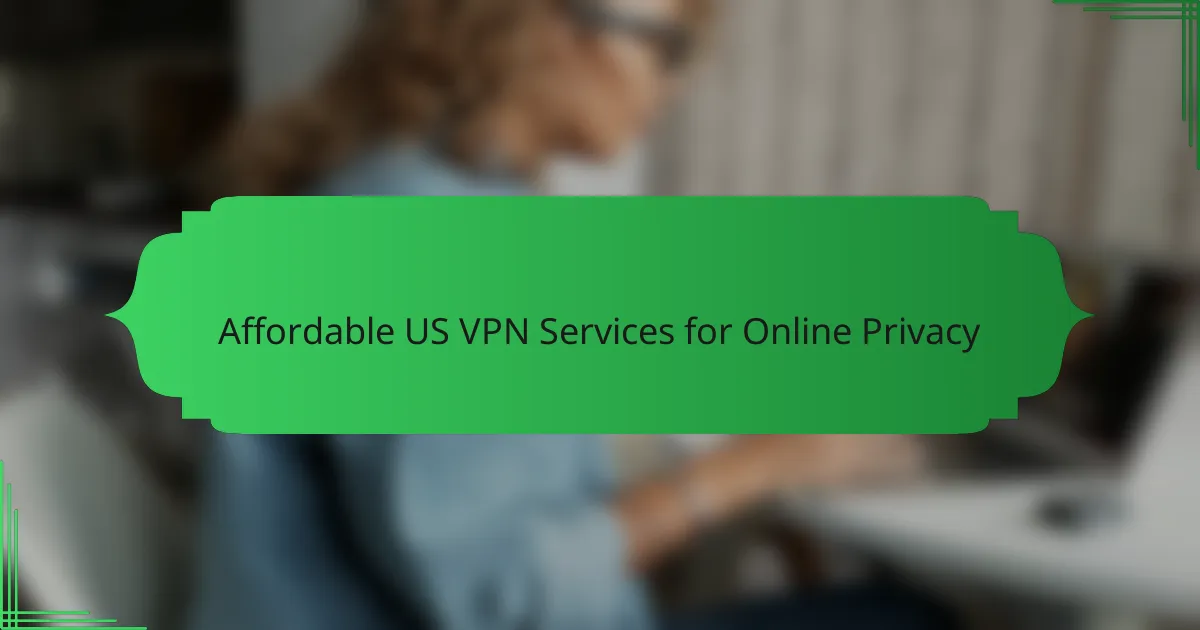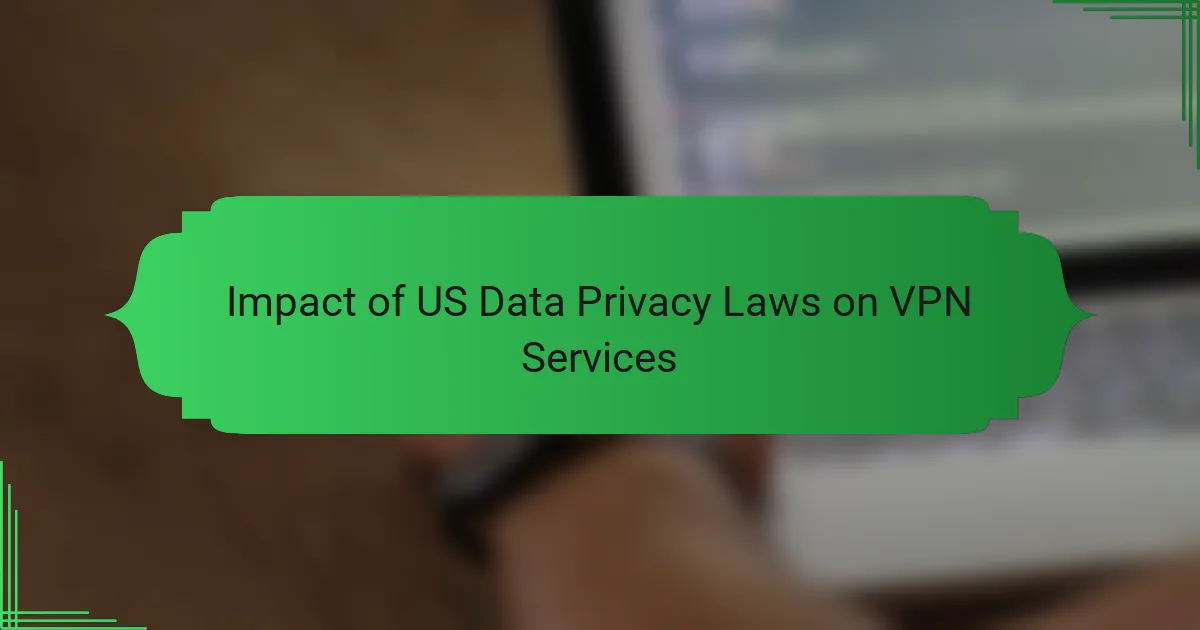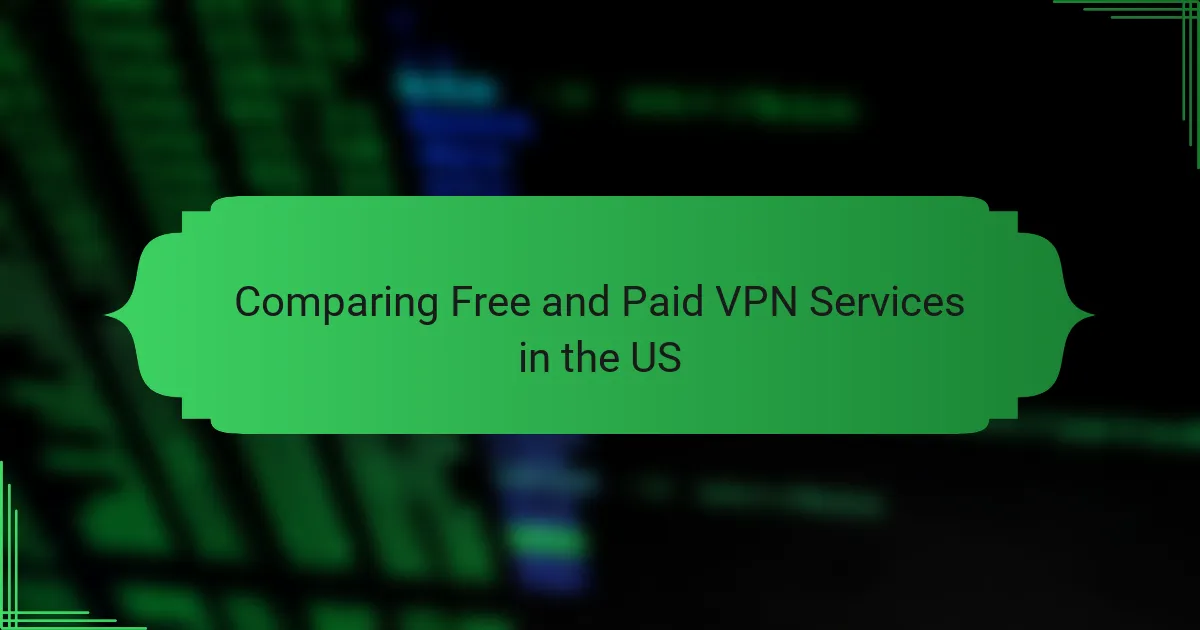Affordable VPN services in the US provide a crucial layer of online privacy by encrypting your internet traffic and masking your IP address. Typically priced between $3 and $10 per month, these services offer a balance of security, speed, and accessibility for everyday users. When choosing a VPN, it’s important to consider factors such as pricing, server locations, and privacy policies to ensure optimal performance and protection.
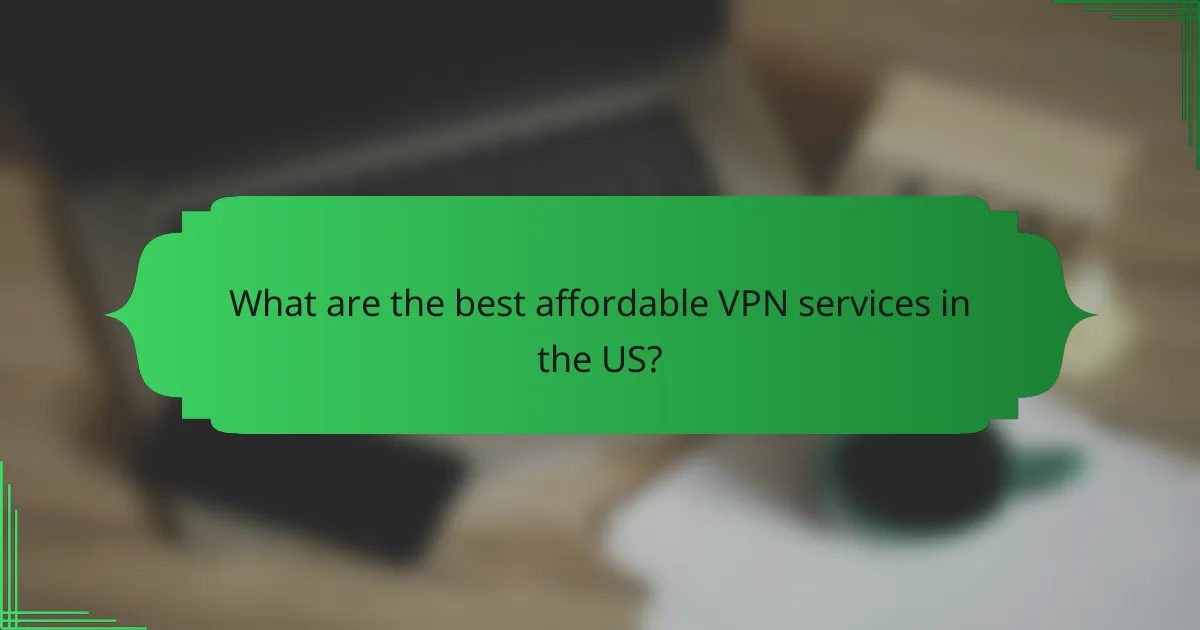
What are the best affordable VPN services in the US?
The best affordable VPN services in the US offer a balance of security, speed, and price, making them accessible for everyday users. These services typically range from $3 to $10 per month, depending on features and subscription length.
NordVPN
NordVPN is known for its robust security features and user-friendly interface. It offers over 5,000 servers worldwide, ensuring fast and reliable connections. With prices starting around $3.30 per month for longer subscriptions, it provides excellent value for users seeking privacy.
Key features include double encryption, a strict no-logs policy, and support for various devices. Users should consider the annual commitment to maximize savings.
Surfshark
Surfshark stands out for its unlimited device connections, allowing users to protect all their devices with one account. Pricing starts at approximately $2.49 per month when opting for a multi-year plan, making it one of the most budget-friendly options.
This VPN includes features like CleanWeb, which blocks ads and trackers, and a no-logs policy. It’s ideal for families or users with multiple devices looking for a cost-effective solution.
Private Internet Access
Private Internet Access (PIA) is recognized for its customizable privacy settings and extensive server network. With plans starting around $2.85 per month, it offers a competitive price for users focused on privacy and security.
PIA supports various protocols and has a strict no-logs policy. Users should explore its advanced settings to tailor their experience according to their privacy needs.
ProtonVPN
ProtonVPN offers a free tier alongside its paid plans, making it an attractive option for users wanting to test VPN services without financial commitment. Paid plans start at about $4 per month, providing additional features like faster speeds and more server locations.
With a focus on security and transparency, ProtonVPN is backed by a team of scientists and engineers. Users should consider the free version to evaluate its performance before upgrading.
ExpressVPN
ExpressVPN is slightly more expensive, with plans starting at around $8.32 per month, but it is renowned for its speed and reliability. It boasts a vast network of servers in numerous countries, ensuring optimal performance for streaming and browsing.
While it may not be the cheapest option, its strong security features and user-friendly experience make it a popular choice among privacy-conscious users. Consider the 30-day money-back guarantee to test its capabilities risk-free.
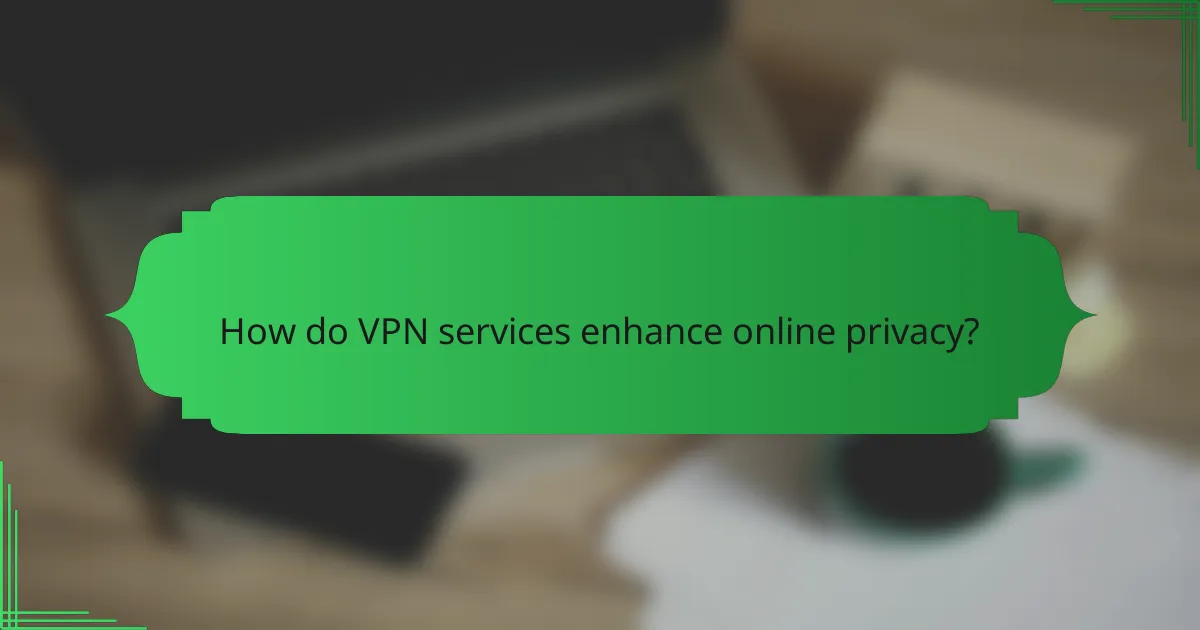
How do VPN services enhance online privacy?
VPN services enhance online privacy by encrypting your internet traffic and masking your IP address. This combination helps protect your data from prying eyes, such as hackers and advertisers, while allowing you to browse the web more anonymously.
Encryption of internet traffic
Encryption of internet traffic is a fundamental feature of VPN services. It transforms your data into a secure format that is unreadable to anyone intercepting it. Most reputable VPNs use strong encryption protocols, such as OpenVPN or IKEv2, which are designed to safeguard your information from unauthorized access.
When using a VPN, your data is routed through a secure tunnel to the VPN server, making it difficult for third parties, including ISPs and cybercriminals, to monitor your online activities. This is particularly important when using public Wi-Fi networks, where data interception risks are higher.
Masking IP addresses
Masking IP addresses is another critical aspect of VPN services that enhances online privacy. By connecting to a VPN, your real IP address is replaced with that of the VPN server, making it challenging for websites and services to track your location and online behavior. This can help you access content that may be restricted in your region.
Additionally, masking your IP address can reduce targeted advertising and tracking by companies, as they cannot easily identify your browsing habits. However, it’s essential to choose a VPN provider that does not keep logs of your activities to ensure maximum anonymity.
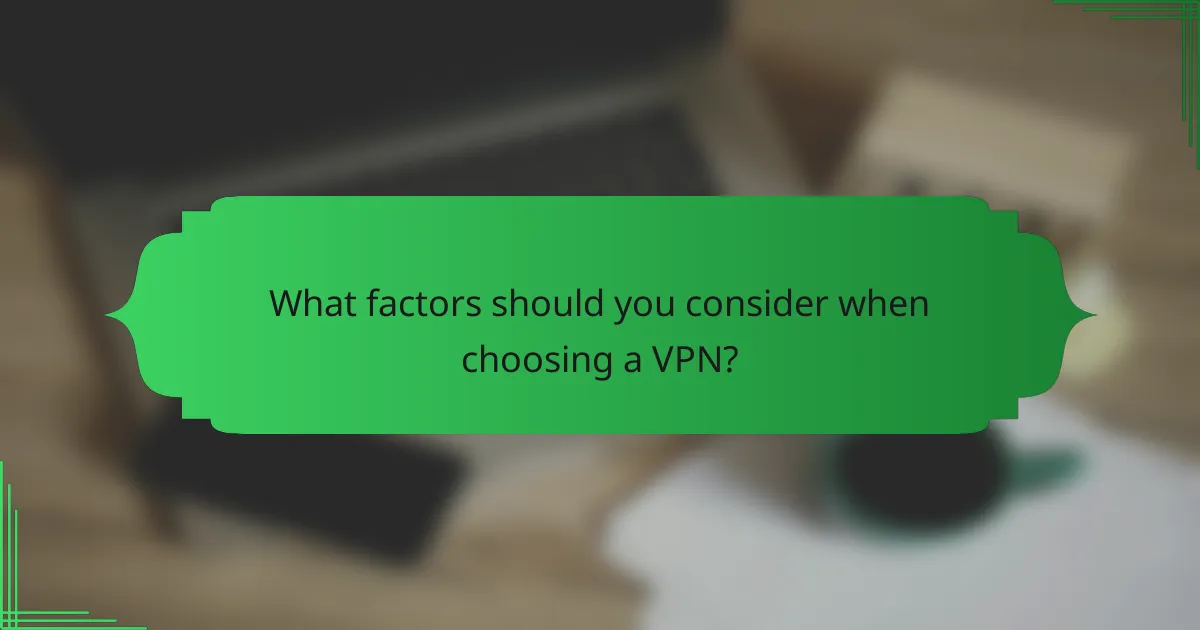
What factors should you consider when choosing a VPN?
When selecting a VPN, consider aspects like pricing, server locations, performance, and privacy policies. These factors significantly influence your online privacy, speed, and overall user experience.
Pricing and subscription plans
VPN pricing can vary widely, typically ranging from a few dollars to over ten dollars per month. Look for plans that offer a good balance between cost and features, such as multiple device support and money-back guarantees.
Many VPNs offer tiered subscription plans, with discounts for longer commitments. Be cautious of free VPN services, as they may compromise your privacy or have limited functionality.
Server locations and performance
The number and distribution of server locations can affect your VPN’s performance and accessibility. A VPN with servers in multiple countries allows you to bypass geo-restrictions and access content from various regions.
Performance is also crucial; choose a VPN that provides fast connection speeds and low latency. Look for user reviews or speed tests to gauge how well a VPN performs in real-world scenarios.
Privacy policies and logging practices
Understanding a VPN’s privacy policy is essential for ensuring your online activities remain confidential. Look for services that have a strict no-logs policy, meaning they do not store any data about your browsing habits.
Additionally, check for third-party audits or transparency reports that verify the VPN’s claims. This can provide reassurance that the service prioritizes user privacy and complies with relevant regulations.
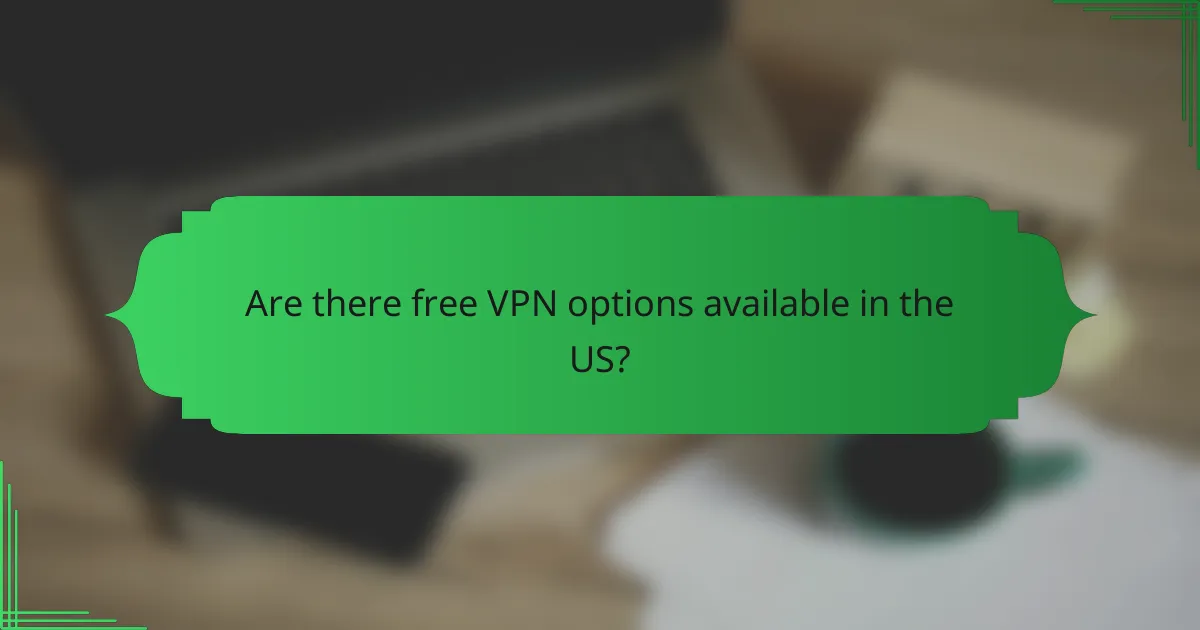
Are there free VPN options available in the US?
Yes, there are free VPN options available in the US, although they often come with limitations such as data caps, fewer server locations, and potentially slower speeds. Users should weigh these trade-offs against their privacy needs and usage requirements.
ProtonVPN Free
ProtonVPN offers a free tier that is notable for its no data limit policy, allowing users to browse without worrying about running out of data. However, the free version restricts access to servers in only three countries and may experience slower speeds during peak times.
To use ProtonVPN Free, simply sign up on their website and download the application for your device. Keep in mind that while it provides a good level of privacy, advanced features like Secure Core and Tor over VPN are only available in paid plans.
Windscribe Free
Windscribe Free provides users with a monthly data allowance of around 10 GB, which is relatively generous compared to other free VPNs. Users can access servers in multiple countries, but the free version may limit some features like ad blocking and firewall protection.
To get started with Windscribe Free, create an account on their site and download the app. Be aware that exceeding the data limit will result in reduced speeds, and users should consider upgrading for enhanced privacy features and unlimited data.
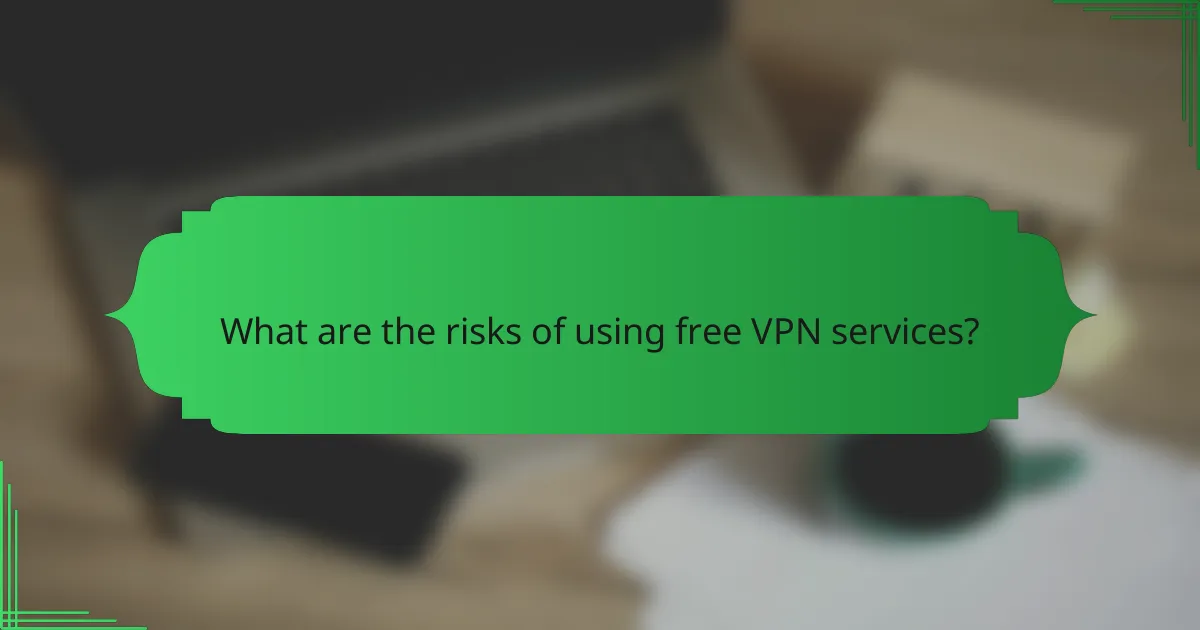
What are the risks of using free VPN services?
Free VPN services often come with significant risks, including compromised privacy and security. Users may unknowingly expose their data to third parties or experience poor performance due to limitations imposed by these services.
Data logging and privacy concerns
Many free VPN providers log user data, which can include browsing history, IP addresses, and connection times. This information can be sold to advertisers or used for other purposes, undermining the very privacy users seek to achieve with a VPN.
Some free VPNs may not have clear privacy policies, making it difficult for users to understand how their data is handled. Always check for a no-logs policy and independent audits to ensure your privacy is protected.
Limited bandwidth and speed
Free VPN services often impose strict limitations on bandwidth and speed, which can lead to frustrating experiences while browsing or streaming. Users may encounter slow connections, frequent disconnections, or data caps that hinder their online activities.
For example, some free VPNs may offer speeds that are significantly lower than paid options, making it challenging to stream high-definition content or download large files. Consider whether the trade-off in performance is worth the cost savings when choosing a VPN service.
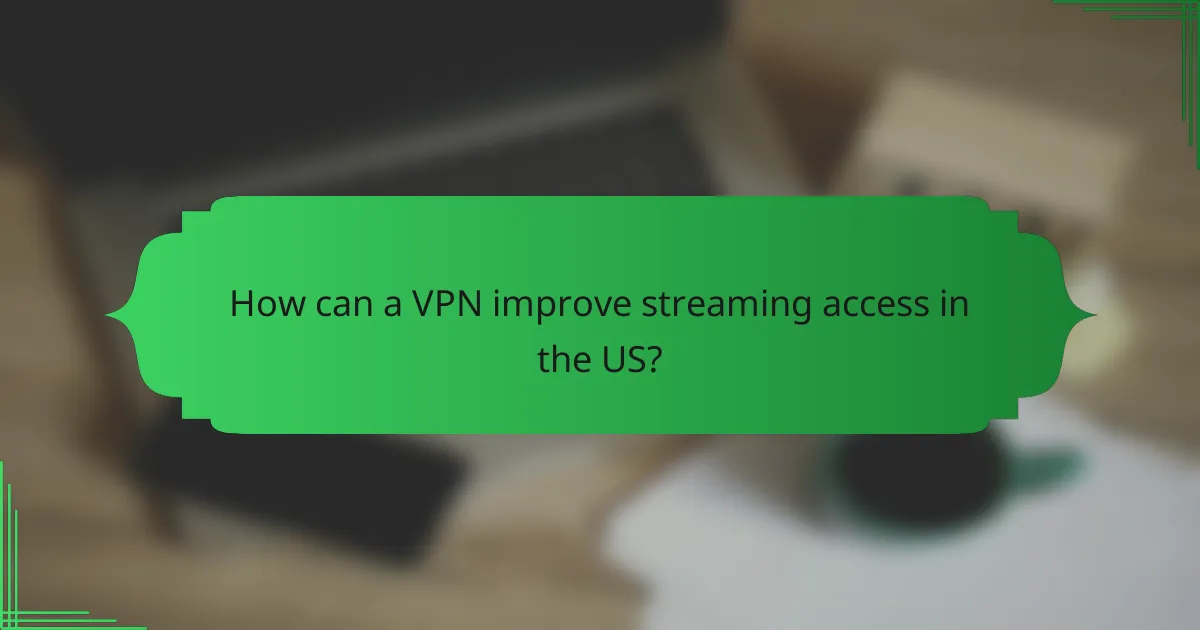
How can a VPN improve streaming access in the US?
A VPN can enhance streaming access in the US by allowing users to bypass geographic restrictions and access content that may be blocked in their region. By masking your IP address and routing your connection through servers in different locations, a VPN enables you to enjoy a wider range of streaming services and content.
Bypassing Geographic Restrictions
Many streaming platforms limit access to their content based on the user’s location. A VPN helps you bypass these geographic restrictions by providing you with an IP address from a different region. For example, if a show is available only in the UK, connecting to a UK-based VPN server can grant you access to that content.
When choosing a VPN for streaming, look for providers that offer a large number of servers in various countries. This increases your chances of finding a server that can successfully bypass restrictions and provide a smooth streaming experience.
Improving Connection Speeds
While some users worry that a VPN may slow down their internet connection, many reputable VPN services can actually enhance streaming speeds. This is particularly true if your ISP throttles bandwidth for streaming services. A VPN can help you avoid throttling by encrypting your traffic and making it harder for your ISP to identify your online activities.
To maximize speed, select a VPN that offers high-speed servers and has a good reputation for performance. Look for options that provide dedicated servers for streaming, as these are optimized for fast data transfer.
Enhancing Privacy and Security
Using a VPN not only improves streaming access but also enhances your online privacy and security. A VPN encrypts your internet traffic, making it difficult for third parties, including hackers and ISPs, to monitor your online activities. This is particularly important when using public Wi-Fi networks, where data breaches are more common.
Choose a VPN that has a strong no-logs policy and uses robust encryption protocols. This ensures that your streaming habits remain private and secure, allowing you to enjoy content without worrying about your data being exposed.
